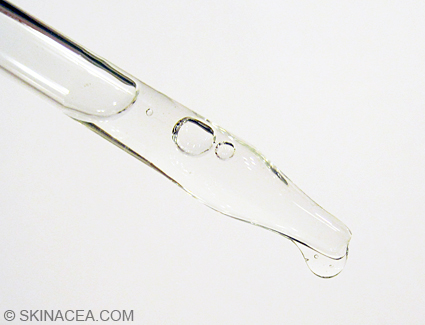Question: Why is hyaluronic acid so drying? Isn't is supposed to be hydrating?
Answer:
A drop of hyaluronic acid serum
What does hyaluronic acid do for your skin?
Hyaluronic acid (HA) is an ingredient included in many "hydrating" moisturizers or serums. It's not only a naturally occurring compound in your skin, but it can also hold up to 1000 times its weight in water. Now that's some serious hydration!
Because of such healing and water-holding properties, hyaluronic acid is widely used for the treatment of burn victims. Some people who use cosmetic serums with this active ingredient claim to see their skin and fine lines "plump up" from the hydration. In fact, some people even claim ingesting hyaluronic acid supplements helps plump up thin lips.
Hyaluronic acid is supposed to be very hydrating, but in reality, it varies from skin type to skin type. Some people find that an HA serum is the best moisturizing boost in the industry, while others experience even more dryness. Whether hyaluronic acid hydrates or dries your skin depends on how you use it and how your skin reacts.
How to use a hyaluronic acid serum
To properly use a hyaluronic acid serum, it needs to be applied onto damp skin and then "sealed" in with a layer of a good moisturizer on top. If applying the hyaluronic acid in this manner still makes your skin feel a bit dry or taut, the hyaluronic acid is probably pulling moisture out of your skin instead of pulling moisture from the air and into your skin.
I live in Texas, where the humidity is absolutely wretched, and sometimes hyaluronic acid serums can feel a bit sticky in this type of weather. However, I also find that if I use a hyaluronic serum alone (without a moisturizer on top), it makes my skin feel dry, even on days when humidity is 90%! My dry skin type is probably more to blame than the product though.
Hyaluronic acid is great for healing burns and hydrating skin, but it isn't a miracle ingredient for everyone. To make hyaluronic acid less drying, try sealing in the hydration with a layer or something emollient. However, if you can't get it to work with your skin, don't lose any sleep over it. It just doesn't work for some people.
Last updated: September 27, 2012
FAQ: Does Differin help with anti-aging?
Back « Skin FAQ

